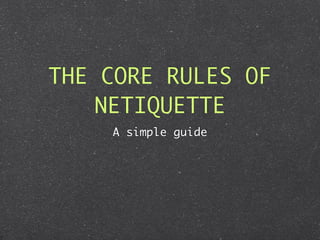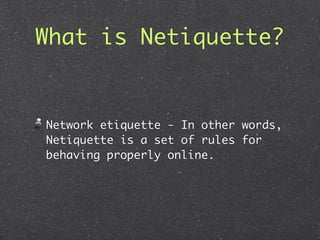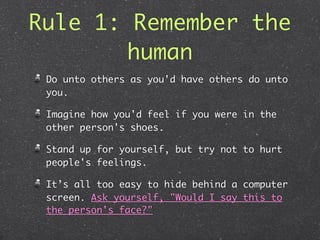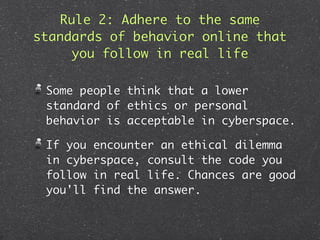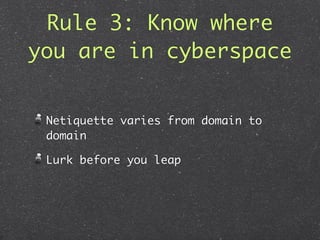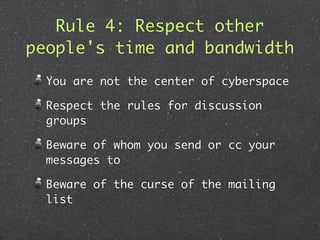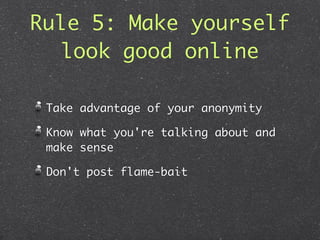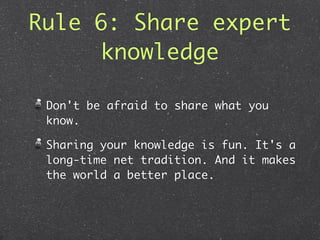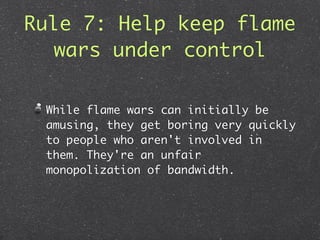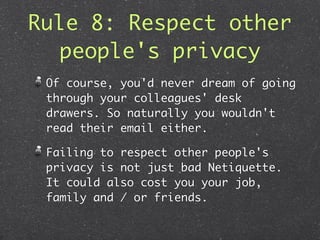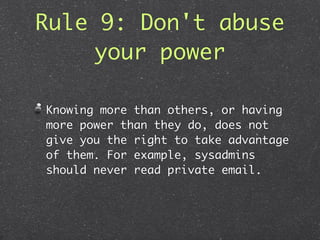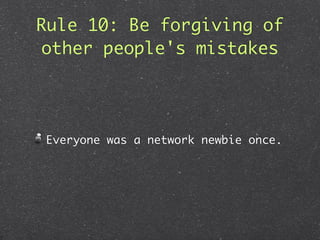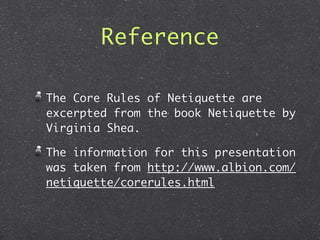Netiquette
- 1. THE CORE RULES OF NETIQUETTE A simple guide
- 2. What is Netiquette? Network etiquette - In other words, Netiquette is a set of rules for behaving properly online.
- 3. Rule 1: Remember the human Do unto others as you'd have others do unto you. Imagine how you'd feel if you were in the other person's shoes. Stand up for yourself, but try not to hurt people's feelings. It’s all too easy to hide behind a computer screen. Ask yourself, "Would I say this to the person's face?"
- 4. Rule 2: Adhere to the same standards of behavior online that you follow in real life Some people think that a lower standard of ethics or personal behavior is acceptable in cyberspace. If you encounter an ethical dilemma in cyberspace, consult the code you follow in real life. Chances are good you'll find the answer.
- 5. Rule 3: Know where you are in cyberspace Netiquette varies from domain to domain Lurk before you leap
- 6. Rule 4: Respect other people's time and bandwidth You are not the center of cyberspace Respect the rules for discussion groups Beware of whom you send or cc your messages to Beware of the curse of the mailing list
- 7. Rule 5: Make yourself look good online Take advantage of your anonymity Know what you're talking about and make sense Don't post flame-bait
- 8. Rule 6: Share expert knowledge Don't be afraid to share what you know. Sharing your knowledge is fun. It's a long-time net tradition. And it makes the world a better place.
- 9. Rule 7: Help keep flame wars under control While flame wars can initially be amusing, they get boring very quickly to people who aren't involved in them. They're an unfair monopolization of bandwidth.
- 10. Rule 8: Respect other people's privacy Of course, you'd never dream of going through your colleagues' desk drawers. So naturally you wouldn't read their email either. Failing to respect other people's privacy is not just bad Netiquette. It could also cost you your job, family and / or friends.
- 11. Rule 9: Don't abuse your power Knowing more than others, or having more power than they do, does not give you the right to take advantage of them. For example, sysadmins should never read private email.
- 12. Rule 10: Be forgiving of other people's mistakes Everyone was a network newbie once.
- 13. Reference The Core Rules of Netiquette are excerpted from the book Netiquette by Virginia Shea. The information for this presentation was taken from http://www.albion.com/ netiquette/corerules.html
Editor's Notes
- #2: \n
- #3: When you enter any new culture -- and cyberspace has its own culture -- you're liable to commit a few social blunders. You might offend people without meaning to. Or you might misunderstand what others say and take offense when it's not intended. To make matters worse, something about cyberspace makes it easy to forget that you're interacting with other real people -- not just ASCII characters on a screen, but live human characters. \n
- #4: When you communicate electronically, all you see is a computer screen. You don't have the opportunity to use facial expressions, gestures, and tone of voice to communicate your meaning; words -- lonely written words -- are all you've got. And that goes for your correspondent as well. \n\nWhen you're holding a conversation online -- whether it's an email exchange or a response to a discussion group posting -- it's easy to misinterpret your correspondent's meaning. And it's frighteningly easy to forget that your correspondent is a person with feelings more or less like your own.\n\nIt's ironic, really. Computer networks bring people together who'd otherwise never meet. But the impersonality of the medium changes that meeting to something less -- well, less personal. Humans exchanging email often behave the way some people behind the wheel of a car do: They curse at other drivers, make obscene gestures, and generally behave like savages. Most of them would never act that way at work or at home. But the interposition of the machine seems to make it acceptable. \n\nThe message of Netiquette is that it's not acceptable. Yes, use your network connections to express yourself freely, explore strange new worlds, and boldly go where you've never gone before. But remember the Prime Directive of Netiquette: Those are real people out there. \n\nWhen you communicate through cyberspace -- via email or on discussion groups -- your words are written. And chances are they're stored somewhere where you have no control over them. In other words, there's a good chance they can come back to haunt you. Any message you send could be saved or forwarded by its recipient. You have no control over where it goes. \n\n
- #5: In real life, most people are fairly law-abiding, either by disposition or because we're afraid of getting caught. In cyberspace, the chances of getting caught sometimes seem slim. And, perhaps because people sometimes forget that there's a human being on the other side of the computer.\n\nOne more point on Netiquette ethics: If you use shareware, pay for it. Paying for shareware encourages more people to write shareware. The few dollars probably won't mean much to you, and they benefit all of cyberspace in the long run. \n\nBreaking the law is bad Netiquette. Some laws are obscure or complicated enough that it's hard to know how to follow them. And in some cases, we're still establishing how the law applies to cyberspace. Two examples are the laws on privacy and copyright. Is it ethical to do something that has poor moral principles on the basis that a law has not yet been created.\n
- #6: What's perfectly acceptable in one area may be dreadfully rude in another. For example, in most TV discussion groups, passing on idle gossip is perfectly permissible. But throwing around unsubstantiated rumors in a journalists' mailing list will make you very unpopular there. And because Netiquette is different in different places, it's important to know where you are. \n\nWhen you enter a domain of cyberspace that's new to you, take a look around. Spend a while listening to the chat or reading the archives. Get a sense of how the people who are already there act. Then go ahead and participate. \n
- #7: It's a cliché that people today seem to have less time than ever before. When you send email or post to a discussion group, you're taking up other people's time (or hoping to). It's your responsibility to ensure that the time they spend reading your posting isn't wasted. \n\nThere's a limit to the amount of data that any piece of wiring can carry at any given moment -- even a state-of-the-art fiber-optic cable. The word "bandwidth" is also sometimes used to refer to the storage capacity of a host system. When you accidentally post the same note to the same newsgroup five times, you are wasting both time (of the people who check all five copies of the posting) and bandwidth (by sending repetitive information over the wires and requiring it to be stored somewhere). \n\nit's easy to forget that other people have concerns other than yours. So don't expect instant responses to all your questions, and don't assume that all readers will agree with -- or care about -- your passionate arguments. \n\nmany news-reading programs are slow, so just opening a posted note or article can take a while. Then the reader has to wade through all the header information to get to the meat of the message. No one is pleased when it turns out not to be worth the trouble.\n\nToday, it's as easy to copy practically anyone on your mail as it is not to. And we sometimes find ourselves copying people almost out of habit. In general, this is rude. People have less time than ever today, precisely because they have so much information to absorb. Before you copy people on your messages, ask yourself whether they really need to know. If the answer is no, don't waste their time.\n
- #8: Networks -- particularly discussion groups -- let you reach out to people you'd otherwise never meet. And none of them can see you. You won't be judged by the color of your skin, eyes, or hair, your weight, your age, or your clothing.\n\nYou will, however, be judged by the quality of your writing. For most people who choose to communicate online, this is an advantage; if they didn't enjoy using the written word, they wouldn't be there. So spelling and grammar do count. \n\nPay attention to the content of your writing. Be sure you know what you're talking about -- when you see yourself writing "it's my understanding that" or "I believe it's the case," ask yourself whether you really want to post this note before checking your facts. Bad information propagates like wildfire on the net. And once it's been through two or three iterations, you get the same distortion effect as in Chinese whispers.\n\nIn addition, make sure your notes are clear and logical. It's perfectly possible to write a paragraph that contains no errors in grammar or spelling, but still makes no sense whatsoever. This is most likely to happen when you're trying to impress someone by using a lot of long words that you don't really understand yourself.\n\nFinally, be pleasant and polite. Don't use offensive language, and don't be confrontational for the sake of confrontation. \n
- #9: The strength of cyberspace is in its numbers. The reason asking questions online works is that a lot of knowledgeable people are reading the questions. And if even a few of them offer intelligent answers, the sum total of world knowledge increases. The Internet itself was founded and grew because scientists wanted to share information. Gradually, the rest of us got in on the act. \n
- #10: "Flaming" is what people do when they express a strongly held opinion without holding back any emotion. It's the kind of message that makes people respond, "Oh come on, tell us how you really feel." Tact is not its objective. \n\nDoes Netiquette forbid flaming? Not at all. Flaming is a long-standing network tradition (and Netiquette never messes with tradition). Flames can be lots of fun, both to write and to read. And the recipients of flames sometimes deserve the heat. \n\n\n
- #11: Enough said!\n
- #12: \n
- #13: If you do decide to inform someone of a mistake, point it out politely, and preferably by private email rather than in public. Give people the benefit of the doubt; assume they just don't know any better. And never be arrogant or self-righteous about it. Just as it's a law of nature that spelling flames always contain spelling errors, notes pointing out Netiquette violations are often examples of poor Netiquette. \n
- #14: \n
